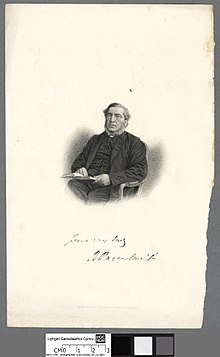| The Very Reverend Robert Payne Smith | |
|---|---|
| Dean of Canterbury | |
 | |
| Church | Church of England |
| Diocese | Diocese of Canterbury |
| In office | 1871 to 1895 |
| Predecessor | Henry Alford |
| Successor | Frederic Farrar |
| Other post(s) | Regius Professor of Divinity, Oxford University (1865–1871) |
| Orders | |
| Ordination | 1843 (deacon) 1844 (priest) |
| Personal details | |
| Born | (1818-11-07)7 November 1818 Chipping Campden, Gloucestershire, England |
| Died | 31 March 1895(1895-03-31) (aged 76) Canterbury, Kent, England |
| Nationality | British |
| Denomination | Anglicanism |
| Parents | Robert Smith and Esther Argles Payne |
| Spouse | Catherine Freeman |
| Children | Six |
| Profession | Clergyman and theologian |
Robert Payne Smith (7 November 1818 – 31 March 1895) was Regius Professor of Divinity at the University of Oxford and Canon of Christ Church from 1865 until 1870, when he was appointed Dean of Canterbury by Queen Victoria on the advice of William Ewart Gladstone.
Early life and education
Payne Smith was born in Chipping Campden, Gloucestershire, on 7 November 1818, the only son and second of four children of Robert Smith, a land agent, and his wife, Esther Argles Payne, of Leggsheath, Surrey. He attended Chipping Campden Grammar School and was taught Hebrew by his eldest sister, Esther. In 1837 he obtained an exhibition at Pembroke College, Oxford to study classics. In 1841 he graduated with second-class honours. Payne Smith won the Boden Sanskrit scholarship in 1840 and the Pusey and Ellerton Hebrew scholarship in 1843.
Career
In 1843, he became a fellow of Pembroke College and was ordained a deacon, and became a priest a year later.
He gave to 1869 Bampton Lectures at Oxford and from 1870 until 1885 he was a member of the Old Testament Revision Committee (the whole duration of the committee's existence).
He provided the chapter on Genesis in Charles Ellicott's Commentary for Modern Readers and the chapter on Zechariah in The Bible Educator; and published the Thesaurus Syriacus (1868–1901, supplement added 1927), later abridged and translated into English by his daughter Jessie Margoliouth as A Compendious Syriac Dictionary (1903). He preached a series of sermons at Oxford beginning in 1858 which he later compiled into a commentary on Isaiah titled "The Authenticity and Messianic Interpretation of the Prophecies of Isaiah."
He died at his deanery on 31 March 1895 and was buried on 3 April in St Martin's churchyard, Canterbury.
Family
Robert and Catherine had six children:
- Robert Payne Smith, ( -1917) cleric.
- William Henry Payne Smith, assistant master at Rugby School.
- Catherine Elizabeth Payne Smith (1854-1944), married Alfred Mellor Watkin.
- Mary Payne Smith (1858-1927)
- Jessie Payne Smith (1856-1933), British Syriac scholar and campaigner for women's suffrage, married David Samuel Margoliouth.
- Esther Payne Smith (1861-1939), benefactor, educator and missionary at Pietermaritzburg.
References
- R. S. Simpson (2005). "Smith, Robert Payne (1818–1895)". Oxford Dictionary of National Biography.
- Ellicott's Commentary for English Readers: A Bible Commentary for English Readers by Various Writers, edited by Charles John Ellicott, 1906 edition, accessed 15 July 2017]
- Rev E. H. Plumptre (ed.) The Bible Educator Vol IV., (London: Cassell Petter & Galpin, 1874), 368-371
- "The Authenticity and Messianic Interpretation of the Prophecies of Isaiah by First Fruits Press - Issuu". 12 May 2020.
Further reading
- Simpson, R. S. (2005) 'Smith, Robert Payne (1818–1895)', Oxford Dictionary of National Biography, Oxford University Press, 2005.
External links
- Dukhrana online searchable version of Payne Smith's Thesaurus Syriacus
- Works by Robert Payne Smith at LibriVox (public domain audiobooks)

| Church of England titles | ||
|---|---|---|
| Preceded byHenry Alford | Dean of Canterbury 1871–1895 |
Succeeded byFrederic Farrar |
| Academic offices | ||
| Preceded byWilliam Jacobson | Regius Professor of Divinity at Oxford 1865—1871 |
Succeeded byJames Bowling Mozley |
 Quotations from Wikiquote
Quotations from Wikiquote Texts from Wikisource
Texts from Wikisource Data from Wikidata
Data from Wikidata
This Oriental Orthodox Christianity–related article is a stub. You can help Misplaced Pages by expanding it. |
This biography of a British linguist is a stub. You can help Misplaced Pages by expanding it. |